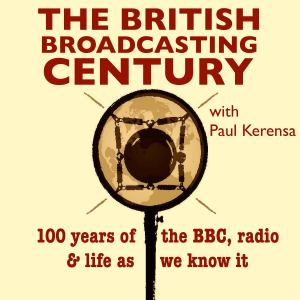
The British Broadcasting Century with Paul Kerensa
History Podcasts
100 Years of the BBC, Radio and Life as We Know It. Be informed, educated and entertained by the amazing true story of radio’s forgotten pioneers. With host Paul Kerensa, great guests and rare archive from broadcasting’s golden era. Original music by Will Farmer. www.paulkerensa.com/oldradio
Location:
United Kingdom
Genres:
History Podcasts
Description:
100 Years of the BBC, Radio and Life as We Know It. Be informed, educated and entertained by the amazing true story of radio’s forgotten pioneers. With host Paul Kerensa, great guests and rare archive from broadcasting’s golden era. Original music by Will Farmer. www.paulkerensa.com/oldradio
Twitter:
@bbcentury
Language:
English
Email:
paul@paulkerensa.com
#105 2BD Aberdeen and R.E. Jeffrey: From First Gaelic Broadcast to First Sci-Fi
Duration:00:49:46
#104 The Radio Times is Launched! A Browse Through Issue 1
Duration:00:36:07
#103 Sept 1923 on the BBC, Rob Roy and Gavin Sutherland
Duration:00:49:12
#102 SB: Simultaneous Broadcasting... and Mary English
Duration:00:49:52
#101 The Sykes Report + Early Recordings Association
Duration:00:48:48
#100 - The Century! British Broadcasting's Story So Far, 1895-1923
Duration:00:53:49
#099 Godfrey Isaacs - The Man Behind The BBC Idea
Duration:00:56:17
#098 Ireland's First Radio Station... and the BBC News theme album
Duration:00:44:00
#097 Manchester, Birmingham, Gardening, Radio Circle + a Wireless Elephant: The BBC in August 1923
Duration:00:34:55
#096 Books on Broadcasting - and the Bodleian Library's 'Listen In' Exhibition
Duration:00:49:39
#095 Five Gold Airings: Vintage BBC Christmases 1922-42
Duration:00:25:25
#094 Wireless Manhunts on the BBC - in 1923 and 2023
Duration:00:46:03
#093 On-Air Symphonies and 'Seeing By Wireless' in June 1923 - and Stuart Prebble
Duration:00:39:59
#092 The First Sports Broadcasts: from 'Yachts Slowly Drifting' to MCR21
Duration:00:39:57
#091 The Electrophone: The 1890s' Streaming Device
Duration:00:40:12
#090 The BBC's First Shakespeare (part 2) & John Henry: First Radio Comedy Personality
Duration:00:36:33
#089 A History of Election Night Specials: 28 in 102 Years
Duration:00:48:29
#088 Boycotts, Bands and The Sunday Committee: May 1923 at the BBC
Duration:00:38:54
#087 The Cello and the Nightingale: A Centenary Celebration
Duration:00:38:35
#086 1932 Off-Air Radio Recordings by Mr F.O. Brown of Greenbank
Duration:00:29:25